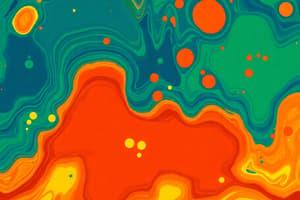Podcast
Questions and Answers
What is the main focus of environmental geosciences?
What is the main focus of environmental geosciences?
What is geodiversity?
What is geodiversity?
Why is understanding geodiversity important?
Why is understanding geodiversity important?
What is a key area of research in environmental geosciences?
What is a key area of research in environmental geosciences?
Signup and view all the answers
What is the role of environmental geosciences in sustainable management?
What is the role of environmental geosciences in sustainable management?
Signup and view all the answers
What is affected by climate change according to environmental geosciences?
What is affected by climate change according to environmental geosciences?
Signup and view all the answers
What is a key aspect of environmental geosciences?
What is a key aspect of environmental geosciences?
Signup and view all the answers
What is an application of geochemistry in environmental geosciences?
What is an application of geochemistry in environmental geosciences?
Signup and view all the answers
Why is communication important in environmental geosciences?
Why is communication important in environmental geosciences?
Signup and view all the answers
What is a goal of sustainable environmental management practices in environmental geosciences?
What is a goal of sustainable environmental management practices in environmental geosciences?
Signup and view all the answers
What is included in the research areas of environmental geosciences?
What is included in the research areas of environmental geosciences?
Signup and view all the answers
What is the ultimate goal of environmental geosciences?
What is the ultimate goal of environmental geosciences?
Signup and view all the answers
Flashcards
Environmental Geosciences
Environmental Geosciences
A multidisciplinary field combining geology, ecology, and environmental science to study Earth's systems and human impacts.
Geodiversity
Geodiversity
The variety of geological features and processes on Earth, including mountains, rivers, fossils, and minerals.
Natural Hazards
Natural Hazards
Events like earthquakes, volcanic eruptions, that cause environmental damage.
Climate Change Impact
Climate Change Impact
Signup and view all the flashcards
Sustainable Environmental Management
Sustainable Environmental Management
Signup and view all the flashcards
Geochemistry
Geochemistry
Signup and view all the flashcards
Geological Processes
Geological Processes
Signup and view all the flashcards
Ecological Processes
Ecological Processes
Signup and view all the flashcards
Carbon Sequestration
Carbon Sequestration
Signup and view all the flashcards
Mining Impacts
Mining Impacts
Signup and view all the flashcards
Public Communication
Public Communication
Signup and view all the flashcards
Educational Materials
Educational Materials
Signup and view all the flashcards
Study Notes
Environmental geosciences is a multidisciplinary field that combines geology, ecology, and environmental science to study the Earth's natural systems and the impact of human activities on these systems. It encompasses a wide range of topics, from understanding natural hazards and their impacts on the environment to exploring the geological processes that shape our planet.
One important aspect of environmental geosciences is the study of geodiversity, which refers to the variety of geological features and processes that occur on Earth. This includes everything from mountain ranges and river systems to fossil deposits and mineral resources. Understanding geodiversity is crucial for managing and conserving these resources, as well as for anticipating and mitigating the risks associated with natural hazards like earthquakes and volcanic eruptions.
Another key area of research in environmental geosciences is the impact of climate change on the Earth's systems. Climate change affects a wide range of environmental processes, from changes in precipitation patterns to the distribution of plant and animal species. Understanding these changes is essential for developing strategies to mitigate their impacts and adapt to a changing environment.
Environmental geosciences also plays a crucial role in developing sustainable environmental management practices. This includes understanding the ecological processes that support healthy ecosystems, as well as the geological processes that can help sequester carbon and mitigate the effects of climate change. For example, the study of geochemistry can help identify strategies for storing carbon in rocks, while understanding the impacts of mining on ecosystems can help inform more sustainable mining practices.
In addition to these research areas, environmental geosciences also involves communication and education. As the field involves complex scientific concepts, it is important to effectively communicate these ideas to the public and to policymakers. This includes developing educational materials, organizing public outreach events, and engaging with the media to promote a better understanding of the science and its applications.
In summary, environmental geosciences is a vital field that seeks to understand the Earth's natural systems and the impact of human activities on these systems. It involves a wide range of research areas, from understanding geodiversity and natural hazards to developing sustainable environmental management practices and promoting public understanding of the science.
Studying That Suits You
Use AI to generate personalized quizzes and flashcards to suit your learning preferences.
Description
Explore the multidisciplinary field of environmental geosciences, which combines geology, ecology, and environmental science to study the Earth's natural systems and the impact of human activities. Learn about geodiversity, natural hazards, climate change, and sustainable environmental management practices.



